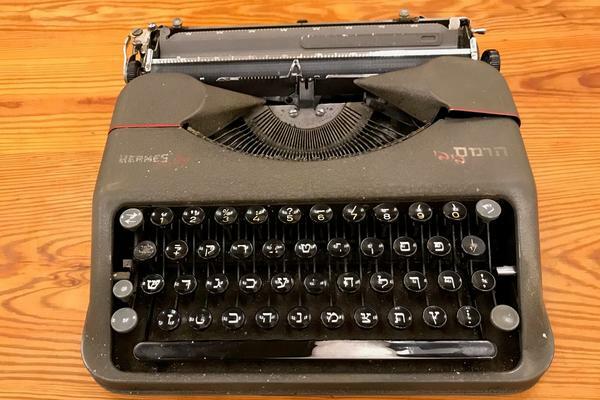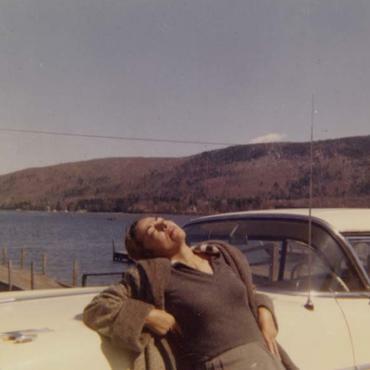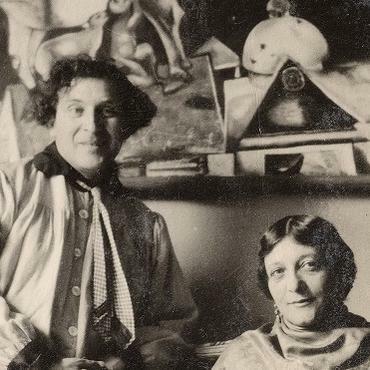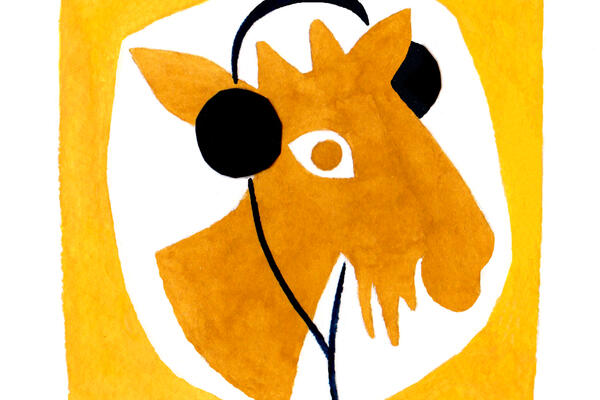
"I Feel a Connection to You"
- Written by:
- Blume Lempel and Chava Rosenfarb
- Translated by:
- Ellen Cassedy Yermiyahu Ahron Taub
- Published:
- Spring 2019
- Part of issue number:
- Translation 2019
A rich epistolary friendship sustained Blume Lempel and Chava Rosenfarb, two extraordinary Yiddish writers. Their letters offer a rare glimpse into the private worlds of these towering literary figures and illustrate the profoundly sustaining power of correspondence.
Blume Lempel (1907–1999) authored two collections of short stories, A rege fun emes (A Moment of Truth) and Balade fun a kholem (Ballad of a Dream). She received the YKUF Prize for Literature awarded by the Yidisher Kultur Farband (Jewish Culture Association, New York), the I. J. Segal Prize awarded by the Jewish Public Library in Montreal, the Osher Schuchinski Prize awarded by the Atran Center of the Congress for Jewish Culture, and the Chaim Zhitlowsky Prize for Literature.
Chava Rosenfarb (1923–2011) was the author of numerous works of poetry and prose, including Der boym fun lebn (The Tree of Life), Bociany, and Of Lodz and Love. She received numerous international literary prizes, including the Manger Prize, Israel’s highest award for Yiddish literature, as well as a Canadian Jewish Book Award and the John Glassco Prize for Literary Translation.
Their correspondence began in 1982 when Rosenfarb reached out to Lempel after reading her stories in Di goldene keyt (The Golden Chain), the prestigious Yiddish journal that was published in Tel Aviv from 1949 to 1995. Sadly, the friendship came to an end after seven years, following the publication of Rosenfarb’s story “Edgia’s Revenge,” a first-person portrayal of a concentration camp official.
Although their writing styles were different—Rosenfarb’s writing is situated in the realm of psychological realism, while Lempel’s is more poetic, jagged, and overtly experimental—the two felt a deep connection on both a literary and a personal level. Their letters laid bare their fears, struggles, and anxieties, their celebration of each other, and their commitment to writing in Yiddish despite the dwindling readership. The two women rarely met, but a deep affection flourished between them.
These selected excerpts are published with the kind permission of Paul Lempel and Goldie Morgentaler.
The correspondence begins when, out of the blue, Blume Lempel receives a letter from Chava Rosenfarb. What follows are selections from the correspondence.
CR to BL, September 22, 1982
Dear Blume Lempel,
I’ve read some of your writing in Di goldene keyt and felt so drawn to it that I asked [the editors] Sutzkever and Spiegelblatt about you. Who are you? I feel very close to your way of writing, your style.
If you agree we should get to know each other, please send me your phone number. Perhaps we can meet when I’m in your country. And do take down my address; maybe you’ll be able to write me a few words.
What I want these lines to convey is that two curious eyes are looking for your name in the pages of Yiddish periodicals and wishing you a healthy New Year and a peaceful spirit at your desk.
With best wishes,
Chava Rosenfarb
P.S. Forgive my scribble-scrabble. I stopped smoking a week ago, and since then I’ve been all thumbs.
BL to CR, September 29, 1982
Dear Chava Rosenfarb,
I almost wrote “beloved” Chava Rosenfarb instead of “dear,” and that would have been the truth. I have read and reread your letter. I’ve read your story “In the Footsteps of I and You,” and I love every word from your pen, or should I say from your soul.
You ask who I am. By way of illustration: As soon as I saw your name on the envelope, I began to tremble. I didn’t open the letter until late that night. I was afraid it would say something impersonal, cold and unfriendly. And what can I tell you, dear Chava? I cried with joy that Chava Rosenfarb had written to me in such a sincere and intimate manner. I had fantasized about writing you, but did not dare. Now I can speak to you. Too bad it can’t be right away.
I asked my friend Chaim Plotkin about you. He was in Montreal at the Conference for Yiddish. He told me that you gave a wonderful reading at the Yiddish conference in Montreal and said you were an energetic woman, attractive and elegant.
Love, Blume
CR to BL, December 2, 1982
Dear Blume,
I’m home from my trip and have had time to read your book [A rege fun emes (A Moment of Truth)]—the lovely gift you sent. I wanted to be sure to read it before I wrote back to you. I knew the book would both satisfy my curiosity and at the same time pique it. I knew I’d be able to sense something about your personality that can’t be put into words—because one’s style, one’s method of writing—these, I believe, truly reveal the face of one’s soul. I found what I was looking for—and I salute you as a writer and urge you to write and write, for the good of Yiddish literature. Because your intellect, your fresh words and images, the flights of your creativity, are original, contemporary, and I would say zaftik [juicy]! We need you!
I still can’t understand why I learned about you so late—I can’t forgive myself. But better late than never. I feel a connection to you, not only because we belong to the same generation, but also because of our spiritual longings.
BL to CR, February 15, 1983
Dear Chava Rosenfarb,
We spent a few extra weeks in Florida and returned to a blizzard. I love blizzards. Black crows on white snow. I throw them breadcrumbs, as on Shabbat Shirah. I remember doing this in my youth. But now I see the snow as a shroud covering everything rotten.
Dear Chava, I don’t want to introduce a note of melancholy, God forbid. I saw that your Bociany will be distributed by the World Council for Yiddish Culture [in Tel Aviv]. This alone is enough to warm the Canadian winter.
As for my so-called anonymity: it is not a condition I have sought out exactly. But in fact, in a certain sense maybe I am a recluse. For me it’s enough to write a story and have it appear in a journal. Beyond that, being in public scares me.
I hope we will meet. Then we can get to know each other without having to say so much.
I wish you many productive days, days of psychic satisfaction.
CR to BL, March 6–7, 1983
Dear Blume,
Something I don’t understand: I’ve asked you twice where you’re from and for some general biographical information. I’m sure you know a lot more about me than I know about you. Yet you haven’t responded, only written that you want the walls of anonymity to surround you, and that from within this fortress of yours, you will send out letters to the world in the form of the stories you publish in magazines. Given this, how can we become good friends in a closer sense, at least a little closer? But I’m tolerant. Do I have a choice? I’ll accept what you’re prepared to say and won’t press you anymore to tell me about yourself.
BL to CR, December 4, 1983
Dear Chava,
As it happened, a letter that should have gone into the mailbox sat in a pocket instead. It was only yesterday, when I started packing clothes to bring with us (yes, we’re going to Florida for the winter), that I found it in my husband’s pocket. Maybe it’s just as well. It was loaded with adjectives. Better not to send such a thing.
Now I’ve reread your story, “Last Love,” and I want to say again, “Wonderful!” I see it as a breakthrough in Yiddish subject matter—both for its theme and for its refined style.
It’s too bad we have so few people in our Yiddish literary world who appreciate originality. If not for Di goldene keyt [The Golden Chain], such artistic stories might never see the light of day.
As I said, we’re planning to leave for Florida in the middle of December. This is the first time we’ll be there for the whole winter. I don’t know if I’ll be able to write there. Here, I have my corner where I can seclude myself. I don’t know what awaits me there.
BL to CR, March 28, 1984
Dear Chava,
I found your letter when I came home, and I must say I was shocked. Where does this “dullness in the head and depression in the heart” come from? You who emerged from hell with so much courage, you who have moved the world with your writing—do you often feel so depressed? I thought you were staying in Montreal [this winter] because you were so absorbed in your work and didn’t want to break the mood. I imagined you at your desk with your hair undone, your thoughts flowing, your pen running across the paper seemingly of its own accord until the story was complete. I even saw the sun shining on the snow outside your window. I envied you. For me you are a person who risks her life to have her say, at the same time remaining entirely feminine.
BL to CR, May 2, 1984
Dear Chava,
How wonderful to have a friend who reads, who understands, who offers a critical word that hits the nail on the head.
Of course, this should be the role of the editor, but unfortunately editors today no longer say anything besides “good” or “I don’t like it.” There’s no exchange between writer and editor. It’s a desert, my dear, a desert.
Thank you for your advice. I’ve revised the story and worked hard on the theme of the sisters, and now the psychological underpinning is stronger.
Your most recent story is realistic, modern, with a language unavailable in any other Yiddish writer. Sometimes I wonder where your knowledge comes from. It makes me want to fall on my knees and thank you for being who you are and for what your writing means to me. At times I feel very pessimistic—for whom are we writing? Then I think of you—you, who give so much and receive so little, who go on with your work—and in Yiddish! Who am I to complain?
Yes, I’ve received your two-volume Bociany. I’ve decided to start reading from the beginning. I won’t say “thank you” because I already owe you so much—and I hope not to die a debtor!
BL to CR, July 16, 1984
Dear Chava,
There comes a time when speaking to you in my head is not enough, and then I take pen in hand and actually communicate what I’m thinking. I have a habit of speaking to you in my mind, you see. In my head I don’t need to choose my words or wait for an answer. In comparison, writing seems banal.
I’ve just finished reading Bociany. I’m a little sorry to let go of Hindele, Yosele, Yankevi, and especially Binele, with all her charming pluses and minuses. I wonder where you encountered such a type—impossible to imagine that you simply invented her. A big city student like you couldn’t possibly have had anything to do with such girls, and yet you’ve created this wonderful character. Thank you for the gift.
CR to BL, July 25, 1984
Dear Blume,
I’m glad you’ve undertaken to have your work translated into English. It’s important both for you and for Yiddish literature. The world should see what we’re made of, and know that we’re no less modern than other literatures. But remember: the translation must be as good as the original. This is essential. Is your translator equal to the task?
BL to CR, November 12, 1984
Dear Chava,
Be well. Write what pleases you, and it will please us all.
BL to CR, March 18, 1985
Dear Chava,
I’ve prepared more than 20 stories for publication by Yisroel Bukh. As you know better than anyone, it was a great deal of tedious work.
The more I read you, the more I admire your talent, your knowledge, your language. I’m astounded by so much beauty; every sentence is as if carved in marble.
CR to BL, June 10, 1985
Dear Blume,
I’m glad your book is on its way to publication. And how wonderful that you’re writing, and living with your writing, that you and your writing are one, that you identify with it so closely, that it plays such an important role in your life. Just the way it is with me. Even when I’m not writing—and now is not a very productive time for me—I live with my writing and feel it is my anchor, my support.
BL to CR, June 18, 1985
Dear Chava,
You continue to astound me with your talent, your knowledge, and your courage. I can’t even imagine undertaking such a monumental work [translating her The Tree of Life into English]. Let’s hope the world of Jewish literature in English will respond and give you the satisfaction your talent deserves.
My situation is entirely different. I would never undertake to write something big and important. A person must feel important, and I lack belief in myself. I also lack time—not because the days are so short but because I waste time on trivial things.
I knew a woman at the Morgn frayhayt who said she couldn’t start writing until she’d cleaned the windows. Well, I don’t clean my windows, but I do insist on doing other housework. I impose this rule on myself.
For example, you ask if I have a large garden. No, it’s not large, but it does require work. I promised myself not to touch the garden this summer. I can buy tomatoes and cucumbers at the supermarket. But then I look at the neglected beds and I’m seized with pity. I grab my shovel and run outside. And the garden rewards me for my efforts. Red and yellow roses lift their faces to me, and the grass is green. Everything wants to live and to thrive. It’s a Jewish garden, with a little of this and a little of that. Everything comes together harmoniously.
CR to BL, June 23, 1985
Dear Blume,
Congratulations on submitting your book to the publisher. When will it come out? I’m sure it will meet with great success. Everything you write is not only well written, but also interesting and easy to read. These qualities don’t always go together, but in your work they do. I look forward to holding the book in my hands.
CR to BL, July 14, 1985
Dear Blume,
I’m glad to see in you a vitality as a writer that I myself don’t possess at this point. You must take care of this vitality. Don’t let go of the thread for even a day. Hold on to it. Once you let it go, it’s very hard to get it back.
BL to CR, August 28, 1985
Dear Chava,
You know what I did—I found Issue #90 of Di goldene keyt and reread your “In the Footsteps of I and You” with great enthusiasm. The elegance of your language stuns me.
When I first read the story, I did not yet know you. I thought that if I were ever to meet the author, I would kiss the ground under her feet. Well, now it’s ten years later. I don’t kiss the ground, but I still admire you. I might not have been able to say this to you face to face—people can be difficult for me.
BL to CR, December 18, 1985
Dear Chava,
I’ve just sent off the proofs to Yisroel Bukh. I’m dead tired—not so much from making the corrections as from reading the stories. I never read my stories after they’re published in the journals, so they seemed strange to me. Instead of paying attention to the typos, I concentrated on the content.
I wanted to answer your last letter right away. Maybe I did answer, just not on paper.
CR to BL, May 16, 1986
Dear Blume,
I’ve just finished reading your book. My head is spinning. Between the red covers, all the stories flow together into a whole and build upon one another, each one infusing the others with added power. If one story stands out from the rest, it’s not because of you but because of me, the reader. (For example, “At My Ancestors’ Graves” had such a powerful effect on me, even the second time around.) I see the book as an original, sweeping novel that comprises the life of our generation: the Old Country, the American continent, Paris, the sea, the countries where we live, and above all the people. How well you know people, how clearly you see them inside and out! How romantic, visionary, and thoughtful you are—you know daily life so well, you see it so splendidly, and you describe it with both a poetic tongue and a realistic flair for detail.
It is perhaps above all an autobiographical novel. You are in it from beginning to end. One senses your presence even when not in the first person. Maybe that’s why your stories affect the reader so intimately.
You don’t need my compliments, and my enthusiasm has only grown since the day I read your first story. I admire the beauty and concision of your language. You are so economical and careful not to waste a word! And most important: the precision with which you analyze the human soul, women’s souls, your own soul.
Blume dear, it’s a blessing to have you in Yiddish literature today. I send you hugs and kisses.
CR to BL, August 22, 1986
Dear Blume,
I’ve just received the sad news about your husband.
I am still stunned and have no words for you, except to express to you my love and to tell you how strongly I empathize with your gentle, sensitive, quiet soul. I know how deeply you can feel pain, and so the shock is that much greater for you than for someone whose heart is protected by armor.
Consoling words are of no use. There are times in life when muteness is the only appropriate language.
I am with you. I love you.
CR to BL, November 13, 1986
Dear Blume,
I imagine you’re back from California and are a little more yourself. Has your life settled down somewhat? Of course, how can one speak of settling when your foundation has been ripped from under you? Nevertheless, one goes on. You must go on.
Writing is good therapy. You know that already from earlier times. I’ve always felt in your writing a kind of clinging to life and to the scraps of beauty that are buried here and there. Now, in the time that looms ahead, I believe your writing will fortify you and give you courage. Don’t think about selling—forget about the book-buyers, at least when you’re at your desk.
Of course you’re right that there is almost no readership. But in fact you have no right to say that, because you are read. Those who still read the Yiddish journals do read your stories. As for books, here too you stand out. You get reviews. Take heart from the fact that you’re appreciated and praised.
Here in Montreal, we have just celebrated with great pomp the tenth anniversary of the Yiddish Committee. There was a big festival, and almost a thousand people came. The crowd was in good spirits, convivial and singing, and for a while the troubles of the world seemed far away.
BL to CR, June 10, 1987
Dear Chava,
I write to you often in my mind. The unwritten letters are the most interesting; they come spontaneously, straight from the heart, and swim away with all the unwritten stories, the uninvented poems.
CR to BL, June 25, 1987
Dear Blume,
Yesterday I read your beautiful story in Midstream and was happy for you. It seems the translator is not the same one as before. She seems good too, I think.
I admire your language and your flights of fancy. Some of your metaphors are truly astounding. You are absolutely unique. I would recognize anything of yours blindfolded. In your hand, realism is always transmuted into poetry. Even in translation, your language sings out.
BL to CR, February 15, 1988
Dear Chava,
Thank you for your warm letter in the middle of winter. I could feel the warmth even before I opened it. Don’t worry that at the moment you’re not writing. Live a little! Nothing will be lost—it will come back to you with interest when you’re back at your desk, at your window, with your cat at your feet and your houseplants whispering to you about what to write and how.
ELLEN CASSEDY is the translator of On the Landing: Stories by Yenta Mash (2018). With Yermiyahu Ahron Taub, she is the co-translator of “Oedipus in Brooklyn” and Other Stories by Blume Lempel (Simsbury, CT: Mandel Vilar Press and Dryad Press, 2016), winner of the 2018 Modern Language Association’s Fenia and Yaakov Leviant Memorial Prize. She was a Yiddish Book Center Translation Fellow in 2015. She is the author of We Are Here: Memories of the Lithuanian Holocaust (2012).
YERMIYAHU AHRON TAUB is the author of four books of poetry, Prayers of a Heretic/Tfiles fun an apikoyres, Uncle Feygele, What Stillness Illuminated/Vos shtilkayt hot baloykhtn, and The Insatiable Psalm. He was honored by the Museum of Jewish Heritage as one of New York’s best emerging Jewish artists and has been nominated four times for a Pushcart Prize and twice for a Best of the Net award. With his colleague Ellen Cassedy, he was the winner of the 2012 Yiddish Book Center Translation Prize for Oedipus in Brooklyn and Other Stories by Blume Lempel. Yermiyahu was a Yiddish Book Center Translation Fellow in 2018.




